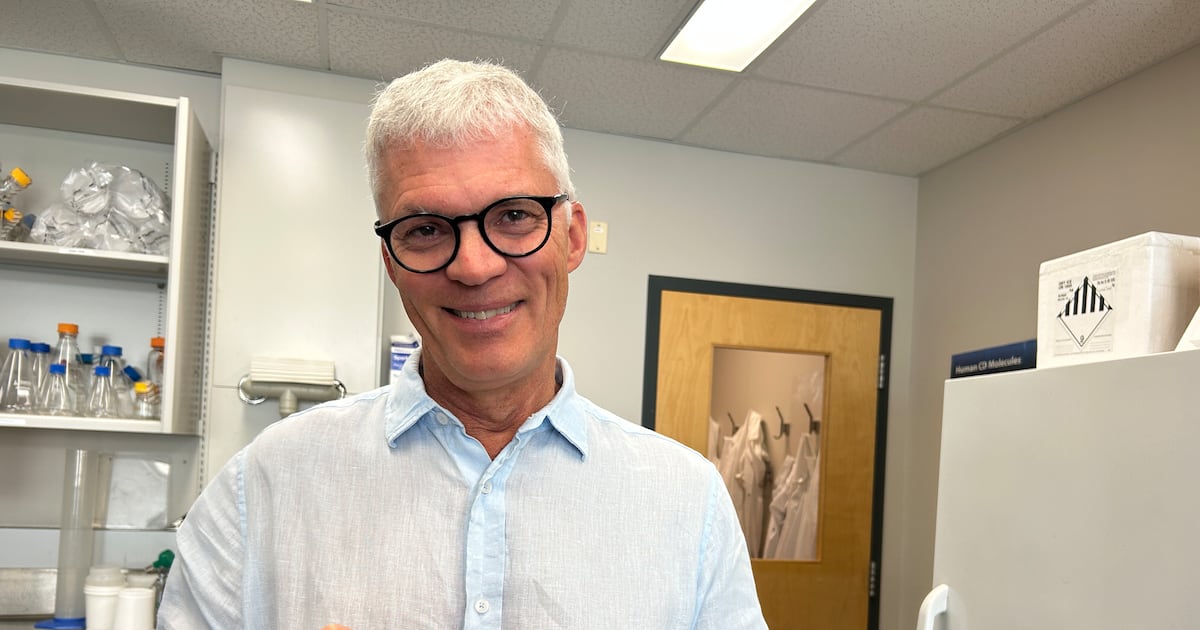Health
Montreal Lab Develops Promising Blood Cancer Treatment, Still Unavailable in Canada

A new treatment for blood cancers, developed in a lab in Montreal, has shown promising results for patients, but remains unavailable in Canada. This experimental therapy, known as UM171 cell therapy, has provided a lifeline for some individuals battling leukemia, offering hope where traditional methods have fallen short.
François Lucas Alzate first faced leukemia in 2014. After achieving remission six months later, the cancer returned in 2015, leading doctors to recommend a bone marrow transplant. Unfortunately, Alzate struggled to find a compatible donor. “Sadly, the hospital was not able to find a compatible donor for me,” he explained. Just when it appeared that options were exhausted, his doctor introduced him to the UM171 cell therapy.
This innovative treatment starts with the collection of stem cells from a baby’s umbilical cord. In a laboratory setting, the UM171 molecule is used to multiply these cells. Following chemotherapy to eliminate cancerous cells, the lab-cultivated stem cells are infused into the patient, akin to a blood transfusion. Alzate experienced a remarkable turnaround. “I am cancer free. The treatment worked well,” he stated.
The development of UM171 has been led by Anne Marinier, head chemist at the Institute for Research in Immunology and Cancer (IRIC) at Université de Montréal. She regards the treatment as a significant advancement in cancer care. “It saves lives, so I think it’s a breakthrough,” Marinier noted.
Hematologist Guy Sauvageau, also a principal investigator at IRIC, elaborated on the therapy’s impact. “About 15 days later, it will reconstitute your entire blood system,” he explained, highlighting its role in rebuilding the immune system.
UM171 was first developed in 2014 and has since been administered to around 120 patients worldwide. Recently, the European Commission expedited the approval process for this therapy, signaling a promising future for its adoption in Europe. Despite this momentum, Sauvageau indicated that Canada remains years away from similar approval. He anticipates that the regulatory process could take an additional five years, as further testing is required.
Alzate, now 33, expressed gratitude for being part of the clinical trial. “I think it probably saved my life,” he remarked, underscoring the personal impact of this breakthrough therapy.
While the road to approval in Canada may be lengthy, the success stories of patients like Alzate demonstrate the potential of UM171. As researchers continue to push forward, there is hope that this innovative treatment will soon be accessible to those in need across Canada.
-

 Education2 months ago
Education2 months agoBrandon University’s Failed $5 Million Project Sparks Oversight Review
-

 Lifestyle3 months ago
Lifestyle3 months agoWinnipeg Celebrates Culinary Creativity During Le Burger Week 2025
-

 Science3 months ago
Science3 months agoMicrosoft Confirms U.S. Law Overrules Canadian Data Sovereignty
-

 Health3 months ago
Health3 months agoMontreal’s Groupe Marcelle Leads Canadian Cosmetic Industry Growth
-

 Science3 months ago
Science3 months agoTech Innovator Amandipp Singh Transforms Hiring for Disabled
-

 Technology3 months ago
Technology3 months agoDragon Ball: Sparking! Zero Launching on Switch and Switch 2 This November
-

 Education3 months ago
Education3 months agoRed River College Launches New Programs to Address Industry Needs
-

 Technology3 months ago
Technology3 months agoGoogle Pixel 10 Pro Fold Specs Unveiled Ahead of Launch
-

 Technology1 month ago
Technology1 month agoDiscord Faces Serious Security Breach Affecting Millions
-

 Business2 months ago
Business2 months agoRocket Lab Reports Strong Q2 2025 Revenue Growth and Future Plans
-

 Science3 months ago
Science3 months agoChina’s Wukong Spacesuit Sets New Standard for AI in Space
-

 Education3 months ago
Education3 months agoAlberta Teachers’ Strike: Potential Impacts on Students and Families
-

 Technology3 months ago
Technology3 months agoWorld of Warcraft Players Buzz Over 19-Quest Bee Challenge
-

 Business3 months ago
Business3 months agoNew Estimates Reveal ChatGPT-5 Energy Use Could Soar
-

 Business3 months ago
Business3 months agoDawson City Residents Rally Around Buy Canadian Movement
-

 Education3 months ago
Education3 months agoNew SĆIȺNEW̱ SṮEȽIṮḴEȽ Elementary Opens in Langford for 2025/2026 Year
-

 Technology1 month ago
Technology1 month agoHuawei MatePad 12X Redefines Tablet Experience for Professionals
-

 Technology3 months ago
Technology3 months agoFuture Entertainment Launches DDoD with Gameplay Trailer Showcase
-

 Business3 months ago
Business3 months agoBNA Brewing to Open New Bowling Alley in Downtown Penticton
-

 Technology3 months ago
Technology3 months agoGlobal Launch of Ragnarok M: Classic Set for September 3, 2025
-

 Technology3 months ago
Technology3 months agoInnovative 140W GaN Travel Adapter Combines Power and Convenience
-

 Science3 months ago
Science3 months agoXi Labs Innovates with New AI Operating System Set for 2025 Launch
-

 Technology3 months ago
Technology3 months agoNew IDR01 Smart Ring Offers Advanced Sports Tracking for $169
-

 Technology3 months ago
Technology3 months agoDiscover the Relaxing Charm of Tiny Bookshop: A Cozy Gaming Escape










